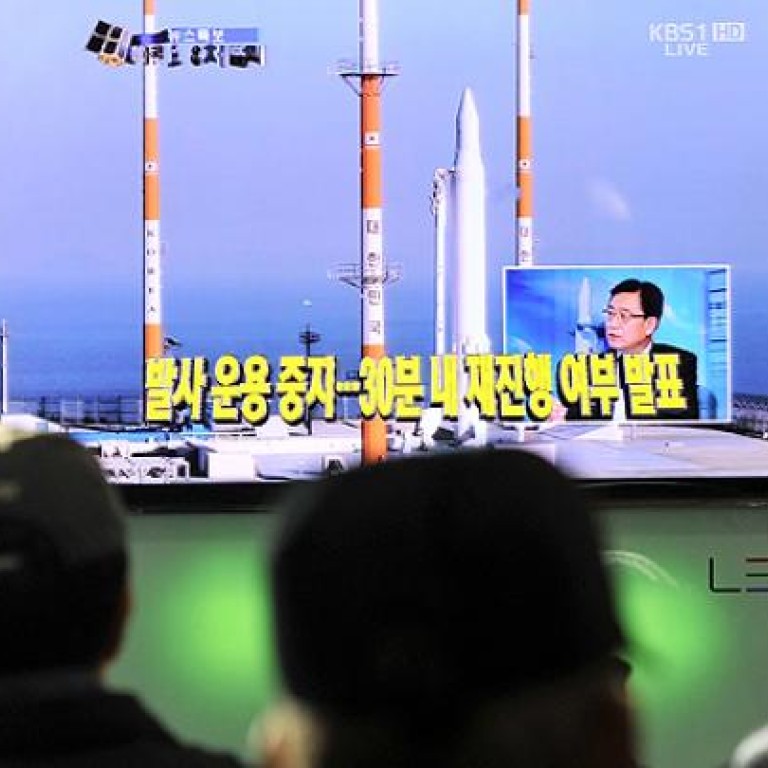
South Korea delays rocket launch as eyes turn to North
South Korea cancelled plans to launch a civilian space rocket on Thursday because of a technical problem amid speculation North Korea may test another ballistic missile.
South Korea cancelled plans to launch a civilian space rocket on Thursday because of a technical problem while speculation mounted that North Korea may defy the international community with another ballistic missile test.
The lift-off of the 33-metre KSLV-I rocket, or Naro, and its 100-kilogram research satellite was halted shortly after 3pm HK time, Cho Yul Rae, vice science minister, said in a televised briefing. He didn’t say when the launch, which will be the country’s third attempt to put a satellite into orbit using a rocket built with domestic and Russian technology, may resume.
Activity at North Korea’s launch site is consistent with preparations before the botched firing of a rocket in April that cost the regime an American food-aid deal, according to satellite company DigitalGlobe. South Korea has spent about US$500 million on the Naro project to gain a toehold in the space- services market while countries including the US contend the North’s program is cover for missile development.
“North Korea may want to restore its national pride after the failed launch,” Baek Seung Joo, who studies the Pyongyang regime’s military at the Korea Institute of Defence Analyses in Seoul, said yesterday by telephone. “If South Korea succeeds with the Naro rocket, the North’s technology will look weak in comparison.”
Kim Jong-un’s government may be in a position to conduct a test by mid-December, DigitalGlobe said on its website, citing a November 23 image of the Sohae satellite launching station.
North Korea, which announced plans for its last launch almost a month in advance, has not signaled another test is imminent while State Department spokeswoman Victoria Nuland declined to comment on November 27 on any intelligence assessment of satellite images.
The regime could behave provocatively at any time, South Korean President Lee Myung Bak said November 27 in remarks to military commanders, without commenting on any preparations North Korea may be making for a missile test. South Korea’s military was watching the North as usual and had not changed its alert levels, an official at the Joint Chiefs of Staff said November 23 after the newspaper reported the US told Japan and South Korea it had detected preparations for a possible missile test.
South Korea’s presidential election on December 19 would weigh against Kim firing a missile before then, said Baek of the defence institute. It would reduce the chances of economic aid from South Korea, harden the US stance against Pyongyang and embarrass the new leadership in China, Kim’s main benefactor.
Naro Rocket
Success with the Naro rocket could bring long-term economic benefits of as much as 3 trillion won for South Korea via higher value-added exports and a share of the space-services market, according to the science ministry.
During the last launch in June 2010, contact with the rocket, which is presumed to have blown up, was lost within minutes of lift-off. On the first attempt in August 2009, a protective cover failed to properly separate from the satellite, causing it to overshoot its planned altitude.
The Korea Aerospace Research Institute is leading the project, in collaboration with more than 150 South Korean companies, including Korean Air Lines, Hyundai Heavy Industries and Doosan Infracore, the agency said on its website.
In April, North Korea failed to launch a rocket that it said was intended to carry a satellite into orbit. The totalitarian nation denied the launch was cover for a long-range missile test in violation of United Nations sanctions.
It disintegrated shortly after takeoff in a debacle that prompted a rare public admission of failure to the outside world. When North Korea fired a Taepodong-2 missile that crashed into the Pacific Ocean in April 2009, it claimed to have successfully placed a satellite in space.

